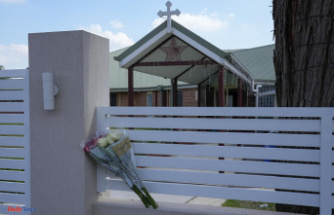In the village of Trunyan in Bali, when an inhabitant dies, the body is placed under a large banyan tree and slowly decomposes in the open air, until only his skeleton is visible. Despite the outbreak of coronavirus, which plays with the funeral traditions, the inhabitants of this indonesian village are not ready to change their rites millennia.
read also : Coronavirus : the church of the cemetery of Bergamo "finally" empty coffinsthrough the archipelago of South-East Asia, the funeral ceremonies are accelerated, the personnel should wear protective equipment, and hugs with loved ones are limited because of distance physical. But the local authorities claim that the village is isolated from the north-east of Bali has not been affected by the virus that infected eight million people in the world, and more than 435.000 victims.
"The funeral rites remain the same, but now we need to wear masks," says Wayan Arjuna, the leader of the village located on the edge of a lake and overlooked by the imposing Batur volcano. "We are afraid to catch the virus", but the traditions will not change, he said. The site has however been temporarily closed to tourists for fear of contamination.
unlike the rest of Balinese, the majority of hindus who practise cremation, or other indonesian christians and muslims bury their dead, the people of Trunyan have specific death rituals.
read also : Nicaragua : "the burial express" to hide the reality of the coronavirusThey profess hinduism, but their beliefs are mixed with animism and traditions specific to the village. Leaving the bodies of their loved ones to rest in the open air to decompose naturally, they think to keep the deceased closer to them. "We feel more connected to those we have lost," says Wayan Arjuna. "Well, when my grandmother died, I had the impression that she was next to me."
A draft "sleepy"The cemetery in the open air is a short boat ride to the village of Trunyan, near Mount Batur, and a large hindu temple in volcanic rock. Eleven cages of bamboo are home to the mortal remains at the foot of a banyan tree, a tree whose smell is supposed to hide the smell of rotting bodies.
In one of the cages, a woman who died recently, might almost seem to be asleep, but his grey complexion belies that first impression. Besides, one can see the bones of a foot protruding clothing that covers your still a body. "At the beginning, I was a little scared to work here, but it's been so long that I'm used to it," says Wayan Sukarmin, a guide that accompanies the last twenty years visitors.
When a team of the AFP visited the site in February, plastic sandals, packets of cigarettes, tubes of toothpaste, and cooking utensils, for the dead, littered the ground. Baskets containing the currency must facilitate the transition to the afterlife of the deceased. "The people here take nothing by this that it belongs to the dead, these are our beliefs," notes the guide.
millennial TraditionsWhen the cages are full, the body is the most ancient of them are transported to an ossuary. And the skulls of the deceased are then kept on an altar of stone. Another cemetery adjoining houses the bodies of children and of singles, while a third site is reserved to those who have died a violent death.
The Balinese mountains, or Bali Aga, say to descend from the population of austronesian indigenous to the island, before the introduction of hinduism. And the main temple of their village dates back to the Tenth century, according to historical sources. But the origin of their funeral rites is still debated. According to a legend, it is because the people fought for the precious banyan that their leaders have decided to drop dead under the tree, for the smell makes the site less attractive.
another legend states that these rites are intended to avoid cremations that might cause the anger of the volcano. Whatever their origin, these rites should still continue for a long time. "It is easier to prevent contamination in a lonely place", note Dewa Made Indra, who is leading the fight against the virus in Bali. And if there was a case "we would put in place special procedures and I think that the villagers would understand".
SEE ALSO , Brazil: 100 graves dug on the beach of Copacabana in tribute to the victims of the Covid-19
Date Of Update: 16 June 2020, 04:47











